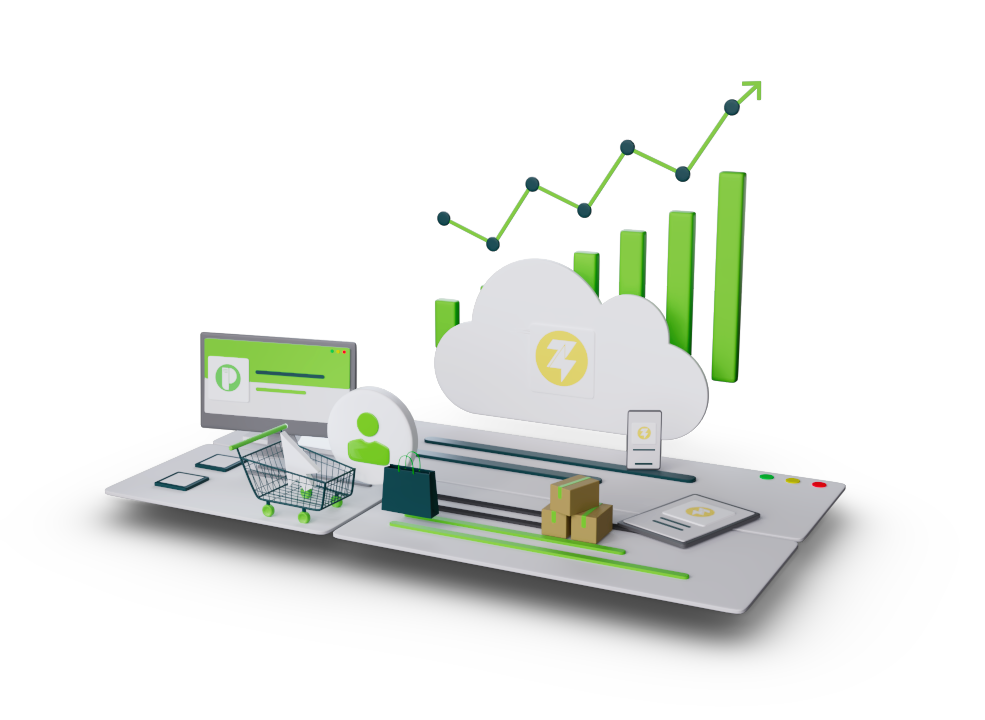Predictive Analytics in Retail POS: How AI Forecasts Trends and Improves Sales

The retail industry is characterized by fluctuating consumer preferences, seasonal demands, and market trends. Traditionally, Retailers rely on past sales data and manual forecasting to plan inventory, pricing, and promotions. This reactive approach, however, often resulted in stock shortages, excess inventory, and missed revenue opportunities. In an era where competition is fierce and margins are tight, relying solely on past data is no longer enough.
The digital transformation of the retail industry has paved the way for a more intelligent approach—one that leverages AI- and ML-driven predictive analytics to anticipate consumer behaviour, optimize inventory management, and improve overall sales performance. Data-driven insights make it possible for businesses to move beyond reactive decision-making and embrace predictive strategies that anticipate customer behaviour.
At the core of this transformation are modern POS (Point of Sale) systems. Unlike traditional POS systems that merely log transactions, AI-powered POS solutions analyse vast datasets in real time to identify patterns, predict demand fluctuations and personalize customer experiences. This shift is driving significant growth in the AI-powered POS market, which is projected to reach $20 billion by 2027. As adoption accelerates, retailers that leverage AI-driven forecasting will gain a decisive edge in managing operations and maximizing revenue.
In this blog, we’ll explore how AI-driven predictive analytics works within retail POS systems, its impact on sales and inventory management, and how solutions like Ginesys empower retailers to provide the ideal customer experience.
The Role of Predictive Analytics in Modern Retail POS
Traditionally, POS systems were just digital cash registers, logging sales and processing transactions. While this data was valuable, it was primarily used for historical reporting rather than future planning. Retailers would look back at past sales trends to make informed predictions about future demand, often relying on gut instinct alongside spreadsheets.
AI-driven predictive analytics has transformed retail POS systems from reactive to predictive by analysing historical sales data, customer behaviour, and external factors such as market trends and economic conditions to forecast its impact on future sales.

Power your retail business with Ginesys’ AI-driven POS software—optimize inventory, enhance customer experiences, and boost profitability with smart forecasting.
How AI-Powered Forecasting Works
Predictive analytics in retail relies on AI models that ingest and analyse sales data, customer behaviour, and external factors (such as holidays, economic conditions, or weather patterns). These models continuously refine themselves, improving their forecasting accuracy over time.
This is what AI-driven POS systems can predict:
- Future sales trends based on past purchasing behaviours and seasonal fluctuations.
- Stock requirements to ensure optimal inventory levels and avoid overstocking or stockouts.
- Customer preferences for personalized promotions and targeted marketing campaigns.
- Potential fraud risks by detecting unusual transaction patterns.
- Workforce needs to schedule employees efficiently based on predicted foot traffic.
Identifying Sales Trends Before They Happen
One of the most powerful capabilities of AI-driven predictive analytics is its ability to detect sales trends before they become mainstream. By analysing customer purchase behaviour, social media trends, and market data, retailers can identify emerging product trends and adjust their strategies accordingly.
For example, a fashion retailer might notice through AI-driven analytics that searches for a particular clothing style are increasing online. By adjusting stock levels in advance, they can capitalize on the trend before competitors catch on.
This ability to predict sales trends ensures customers find what they’re looking for, improving brand loyalty and boosting revenue.
How Predictive Analytics Helps Identify Trends
- Early Detection of Popular Products: AI algorithms analyse purchase patterns and market data to identify trending products before they reach peak demand.
- Seasonal and Regional Insights: Retailers can forecast seasonal shopping behaviours and regional preferences, ensuring they stock the right products at the right time.
- Targeted Marketing Campaigns: Predictive insights allow retailers to design targeted promotions to capitalize on upcoming trends and boost sales.

Eliminate stockouts and overstock issues with smart forecasting—upgrade your POS system with AI-driven inventory management today.
AI-Driven Inventory Optimization: Stocking Smart, Not Just Stocking Up
Inventory mismanagement can cripple retail profits. Too much stock leads to high holding costs and markdowns, while too little results in lost sales and frustrated customers. AI-powered POS systems help retailers maintain just the right amount of stock by analysing purchasing patterns and predicting future demand.
By integrating POS data with AI-driven inventory management, retailers can:
- Reduce stockouts by replenishing fast-moving products before they run out.
- Minimize overstocking by identifying slow-moving items and adjusting purchase orders accordingly.
- Optimize warehouse space by storing products based on anticipated demand.
Some AI systems even automate restocking processes, placing orders with suppliers when inventory dips below a predicted threshold. This ensures products are always available without excessive manual oversight.
Benefits of AI-Driven Inventory Optimization
- Minimized Stockouts and Overstocking: AI can predict demand fluctuations, which aids retailers in stocking just the right amount of inventory.
- Automated Replenishment: Smart POS systems automate restocking based on predictive insights, eliminating manual intervention and errors.
- Supplier Performance Analysis: AI assesses supplier reliability and delivery timelines to improve procurement efficiency.
Personalizing Customer Experiences with AI Forecasts
Customers expect personalized experiences, and AI-powered POS systems enable hyper-targeted engagement. With predictive analytics, retailers can offer shopping experiences tailored to individual customer preferences and buying behaviour.
AI can enhance customer personalization in the following ways:
- Personalized product recommendations both in-store and online.
- Personalized promotions and discounts based on purchase history help increase conversion rates.
- Retailers can design enhanced loyalty programs that resonate with customers, driving up retention rates.
- AI-driven POS systems can integrate with CRM platforms for deeper insights, allowing businesses to easily refine customer engagement strategies.
For example, a grocery store POS system using AI can identify that a particular customer frequently buys plant-based products. The next time they visit, the system can prompt cashiers to offer personalized discounts on new vegan items or suggest a relevant promotion via an app notification.

Price Optimization: Finding the Sweet Spot for Profits
Pricing strategy is one of the most powerful levers for retail profitability. AI-driven dynamic pricing models analyse competitor prices, demand patterns, and customer behaviour to suggest optimal pricing in real-time.
For example, if a POS system detects an uptick in demand for a specific brand of sneakers, AI can recommend a price increase to maximize margins. Conversely, if a product isn’t selling as expected, AI can trigger a discount to boost sales while avoiding dead stock.
- Real-Time Market Analysis: AI can monitor competitor prices and market trends to adjust pricing dynamically.
- Optimal Discounting Strategies: Predictive analytics determines the right discount levels to attract customers without compromising profitability.
- Demand-Based Pricing Adjustments: AI models adjust prices based on demand fluctuations to maximize revenue opportunities.
Fraud Detection and Loss Prevention with Predictive Analytics
Retail fraud costs businesses billions every year. AI-powered POS systems help detect and prevent fraudulent activities by analysing transaction patterns and flagging anomalies in real time.
Some ways AI enhances fraud detection include:
- Identifying unusual purchase behaviours, such as multiple high-value transactions in a short period.
- Spotting discrepancies between physical inventory levels and recorded sales.
- Flagging returns fraud by recognizing patterns of excessive returns from specific customers.
.webp)
Simplify in-store operations with Ginesys Desktop POS—fast billing, smart inventory management, and AI-driven insights to enhance retail efficiency.
Enhancing Workforce Management Through Forecasting
Effective workforce management is key to running a smooth operation and delivering great customer service. AI-driven predictive analytics helps retailers schedule staff more efficiently by analysing demand trends. By predicting busy and slow periods based on sales data, holidays, weather, and local events, businesses can ensure they have the right number of employees on hand—avoiding both understaffing and unnecessary labour costs.
For example, if an AI model predicts a surge in foot traffic during a holiday weekend, managers can schedule additional staff accordingly. Conversely, if data suggests lower sales during weekday mornings, labour costs can be reduced by adjusting shifts.
This smarter approach boosts productivity and service quality while keeping expenses in check. With better staff allocation, retailers can create a smoother shopping experience.
The Latest Innovations Driving AI in Retail POS
1. Generative AI for Personalized Shopping
Retailers are increasingly incorporating generative AI to enhance personalization. By analysing customer data, generative AI creates dynamic product recommendations and tailored marketing messages, improving engagement and retention.
2. Augmented Reality (AR) Integration
AR technology is becoming mainstream, enabling customers to visualize products in real-world settings before purchasing. This immersive shopping experience is proving to significantly boost conversion rates and reduce return rates.
3. Voice-Activated POS Systems
Voice-enabled POS systems are streamlining retail operations by allowing hands-free transactions. This technology enhances efficiency in busy retail environments, reducing checkout times and improving the overall customer experience.
4. IoT-Driven Real-Time Inventory Tracking
The integration of IoT (Internet of Things) devices in retail POS allows real-time tracking of in-store movements and stock levels. This data feeds directly into AI-driven analytics, ensuring precise demand forecasting and timely stock replenishment.
5. Sustainability-Driven AI Enhancements
Retailers are leveraging AI for sustainable inventory management, reducing waste and improving eco-friendly practices. AI-powered POS systems help optimize stock levels to minimize excess inventory, aligning with consumer demand for environmentally responsible businesses.
How Ginesys Empowers Retailers with AI-Driven POS Software
Ginesys is aiming to be at the forefront of AI-powered retail solutions, by providing advanced predictive analytics capabilities to enhance retail performance and deliver exceptional customer experiences. Whether managing a single store or a retail chain, Ginesys’ POS software provide deep analytics, automation, and omnichannel integration.
Comprehensive POS Solutions for Every Retail Model
- Desktop POS System: Connect your physical stores and eCommerce platforms with a powerful, offline-first Desktop POS that ensures smooth operations and real-time data sync.
- Cloud/Web POS System: Leverage a cloud-powered POS that offers real-time access to sales, inventory, and customer data from anywhere.
- Mobile POS System: Enable on-the-go checkouts and self-service kiosks with a robust mobile POS, improving customer experience and reducing checkout time.
AI-Driven Insights for Smarter Retail Decisions
- Predictive Sales Analytics – AI analysis of sales trends to optimize inventory and prevent stockouts is coming soon.
- Automated Omnichannel Routing – Seamlessly sync pending orders from eCommerce platforms and fulfil them at the POS. This is currently rules based but will become AI based in the future.
- Customer Data & Loyalty Sync – Ensure accurate customer information and loyalty points across online and offline channels.
- Fraud Detection & Security – AI based monitoring of transactions to detect anomalies and prevent fraud, AI-based engine to check if data sync between various services is happening smoothly, all of this is coming soon.
A Unified Retail Suite for Omnichannel Growth
Ginesys POS is deeply integrated with Ginesys One ERP and Order Management Systems (OMS) to enable automated order routing, real-time stock updates, and simplified omnichannel retailing.

Stay ahead of demand with AI-powered predictive analytics—optimize inventory, pricing, and customer engagement effortlessly.
Retailers that integrate AI-powered predictive analytics into their POS systems are setting the stage for a more agile, customer-centric, and profitable future. With the ability to anticipate trends, optimize inventory, personalize customer interactions, and dynamically adjust pricing, businesses can make smarter, faster decisions that drive long-term success. Beyond just improving operational efficiency, AI-driven forecasting enables retailers to navigate market uncertainties with confidence.
The future of retail is data driven. Companies that embrace predictive analytics today will build stronger customer loyalty, maximize revenue opportunities, and build a competitive edge in the digital marketplace. The question is no longer about whether AI should be part of retail strategies—it’s about how effectively and quickly businesses can implement these transformative solutions to lead the industry forward. Lead the future of retail with Ginesys’ retail POS software. Schedule a demo today.
